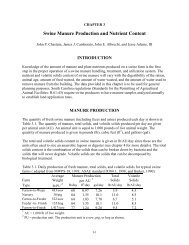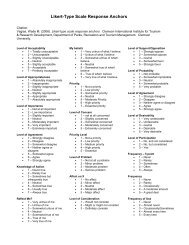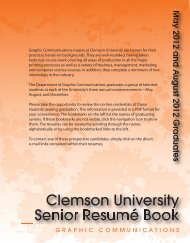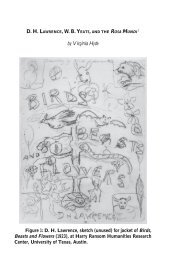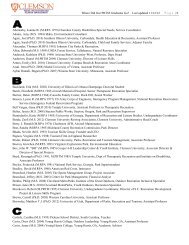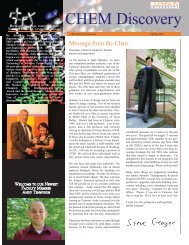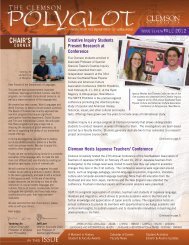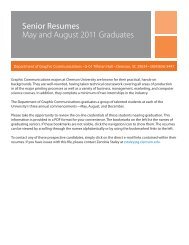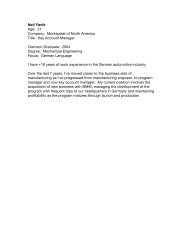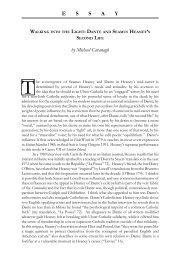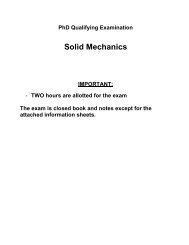Woolfian Boundaries - Clemson University
Woolfian Boundaries - Clemson University
Woolfian Boundaries - Clemson University
You also want an ePaper? Increase the reach of your titles
YUMPU automatically turns print PDFs into web optimized ePapers that Google loves.
40 WOOLFIAN BOUNDARIES<br />
miners at the Labour Exchange—boys, young men in their prime and old men, idle owing<br />
to the pits being shut down” (72). Woolf, contemplating the “beef with its attendant<br />
greens and potatoes” at Girton, a meal which for her evoked “women with string bags on<br />
Monday morning,” was perfectly correct in her observation that “coal-miners doubtless<br />
were sitting down to less” (AROO 19).<br />
Th ese conditions, Woolf argued, prevented the members of the Women’s Co-operative<br />
Guild from becoming suffi ciently “detached and easy and cosmopolitan” (“Introductory<br />
Letter” xxiv) to write prose that would satisfy the discerning “literary critic.” Indeed,<br />
in “Th e Leaning Tower,” she argued that they prevented the development of any signifi cant<br />
working-class writing to the extent that if one were to take away “all that the working class<br />
has given to English literature…that literature would scarcely suff er; take away all that the<br />
educated class has given, and English literature would scarcely exist” (CE2 168). Th e comments<br />
brought a response from, among others, the miner and writer B. L. Coombes, who<br />
argued “if one accepts the statement by Virginia Woolf as it is written it means that no<br />
one who works at manual labour can ever hope to be a writer. She may not have thought<br />
of it that way but the result must be so (Jones and Williams 65). As Bill Jones and Chris<br />
Williams observe, Coombes acknowledges Woolf’s arguments and himself emphasises the<br />
ways in which material conditions constrain working-class writers. Nonetheless, although<br />
he “adopts the broad parameters of Woolf’s analysis” he insists that the “value of working-class<br />
writing” lies in its origin in varieties of experience not available to the writers<br />
with “an expensive education” (Jones and Williams 64). Indeed, he argues it is a distinct<br />
form of literature, albeit an evolving one inevitably constructed using inherited structures<br />
and techniques. Th e tension is founded, in part at least, however, upon Woolf’s concept<br />
of art as “detached” and “cosmopolitan.” In A Room of One’s Own, for example, she observes<br />
that although Charlotte Brontë “had more genius in her than Jane Austen,” this<br />
was undermined by her “indignation,” with the result that Jane Eyre became “deformed<br />
and twisted,” as she “will write in a rage where she should write calmly.” Without material<br />
security, Brontë could not attain the “detachment” that would have prevented or at least<br />
limited such “rage,” and Woolf speculates about what might have happened had she “possessed<br />
say three hundred a year—but the foolish woman sold the copyright of her novels<br />
outright for fi fteen hundred pounds” (AROO 70). For working-class women such as Mrs.<br />
F. H. Smith, living on one pound twelve shillings a week, it was obviously impossible<br />
to attain “intellectual breadth” on such terms. Th e “good gifts” of “wit and detachment,<br />
learning and poetry,” are consequently things “we” give to “them,” the preserve of those<br />
“who have never answered bells or minded machines” (Woolf, “Introductory Letter” xxx).<br />
Th e culture of the “writing classes” existed and had an established form. It could be extended<br />
to “Mrs. Th omas, or Mrs. Langrish, or Miss Bolt” through education and material<br />
prosperity, but was not modifi ed by an “adventurer in literature” (Jones and Williams 65)<br />
such as Coombes, whose work, far from being “detached,” explicitly dealt with economic<br />
and political conditions in the South Wales coalfi elds.<br />
In her description of the Women’s Co-operative Guild congress she attended in 1913,<br />
Woolf noted:<br />
All these questions—perhaps this was at the bottom of it—which matter so intensely<br />
to the people here, questions of sanitation and education and wages, this



